#patrick rabbi milligan
Text
You Suit Me . . . ~Chapter One
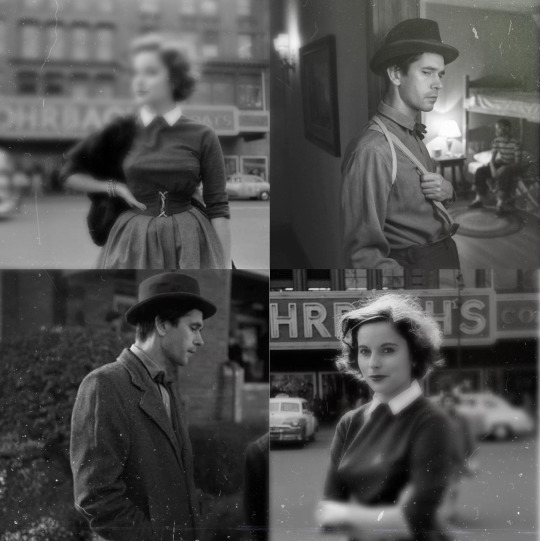
// Rabbi Milligan (Patrick Milligan) x *OC
*AU second daughter of Donatello Fadda
Summary: After the ‘double cross’ that ended the Yiddles family, Rabbi Milligan is taken in by Donatello Fadda and grows up with the Fadda family. While living in the Fadda household, Rabbi is befriended by Donatello Fadda’s youngest daughter, Noemi Fadda (AU OC). A romantic relationship develops.
Warnings: Some mentions of blood and gore
Note: Somewhat follows the progression of the show (Fargo, Season Four) but will take a hard AU turn eventually. Essentially, a ‘secretly dating’ troupe!
_
A quick visit with Loy Cannon, that’s what Rabbi had said and yet, Noemi Fadda waited with an apron tied around her waist in the Fadda family dinning room long after her father and the others were meant to return.
It was Sunday dinner and all guests—save for her mother and herself—were running late.
Her mother, Chianna Fadda, had resigned from waiting and took to her bedroom with a glass of wine. From Noemi’s speculation, Chianna Fadda did that a lot these days. Noemi suspected it had something to do with her youngest brother, Zirominu—or “Zero”—being sent to live with the Cannon family. Noemi considered her mother to be handling the separation from her son a lot better than she could have handled it. Noemi imagined carrying a baby for nine months, many sleepless nights and early mornings, raising a child, feeding it, watching it grow into a precious little boy and then, her father simply plucking that child from existence in your family home. Where does the love go? Noemi felt a sinking feeling in her chest whenever she thought about her baby brother and his current predicament—being forced to live with strangers all these months.
A pleasant distraction arrives in the form of someone entering through the back door near the kitchen. Rising from her seat, Noemi leaves the dinning room to go towards the clatter of the screen door. She finds Rabbi Milligan and “Satchel”—Loy Cannon’s youngest son—arriving home.
“Where were you?” Noemi exclaims. “Dinner is cold, mama’s upset!” Noemi looks towards the ceiling with her hands spread out. Though she gripes, no one hears. Rabbi Milligan is midway through instructing Satchel to go to his room and wait for him while he talks with Noemi alone.
The situation looked very serious. Any qualms Noemi possessed for being stood-up on a dinner she spent the majority of the day preparing flee when she watches Satchel leave and Rabbi look to her very gravely.
“What?” Noemi asks.
Though Rabbi feels the need for it, he refrains from touching her.
Instead, Rabbi gestures Noemi to come near him with a slow flit of his hand.
“We have ta’ talk,” gravelly voice to match that look he gave her.
Noemi approaches Rabbi as he pulls out a chair for her at a small two seater-table in the Fadda family kitchen. Taking the seat across from her, Rabbi rests his arms on the table as he begins, “there’s been’a accident.”
“What happened?” A hitch of concern in Noemi’s voice as she sits with Rabbi. The fear—the anxiety she felt made her feel like doing anything but sit. Her father traveled with quite the entourage of men and yet, only Satchel and Rabbi returned home. She squirms in her chair as Rabbi slowly licks his lips and prepares to tell her more.
“Your brother is fine, as is everyone else, but your father’s been admitted to the public hospital; he’s lost a’lot of blood, but ee’s stable. The doctor is keepin’ him a few days for observation.”
Noemi looks neither relieved or nor alarmed to hear all of this from Rabbi Milligan. Perplexity is her sole expression in the Irishman’s eyes.
“What kind of accident was dad in?” Noemi presses him. Hearing a statement like, ‘your father had lost a lot of blood,’ is no news to easily digest.
“Ah, yea.” Taking a breath to gather his words, “the car was at ‘n intersection near the school, some boys were playin’ with toy guns, one of them must’ve been a pellet gun.” Rabbi’s eyes shift from Noemi to his hands on the table, uneasy with the task of notifying the family of his boss and keeper. “The gun went off, hit your father in the backseat, ‘ee has a neck wound but ee’is being treated for it, like I said.”
Filled in at last, Noemi does not know how to respond to the news of her father’s ‘accident’.
While Noemi sits in a stunned silence, Rabbi finally does what he wanted to do before. He reaches across the table and collects Noemi’s hand; a rare move for him, considering his place beneath her in the household. “Would you be needin’ assistance in tellin’ your mother?”
Noemi Fadda had been preparing her family’s meals since she was old enough to turn on the stove all by herself. With cooking, came lots of cleaning and caring for the house, a role expected of her, especially as she was not yet married and out of the house like her sister, Naneeda. Noemi’s hand felt very cold and dry in Rabbi’s warm grasp.
Swallowing quietly to reanimate herself, lost in her thoughts as she was, Noemi straightens up in her seat, a kind of quiet excitement and exhilaration hits her when Rabbi—or ‘Patrick’—had taken her hand and held it.
Shaking her head, Noemi assures, “no, I can tell her.”
As Rabbi lets go of Noemi’s hand, Noemi rises from the table and takes a step past Rabbi when suddenly she stops and turns back to him.
Impulsiveness possesses her like a soft and lonely ghost as the young woman eases down onto Rabbi Milligan’s lap, sitting on him as if it were the most natural thing in the world to do.
Alarmed but resisting futilely, Rabbi wears a look of concern as he gathers Noemi’s slight shoulders in his hands and looks into his secret lover’s eyes, preparing to turn her away. He whispers an urgent reminder of their boundaries, “Nomi—“
Nomi—that was his nickname for her, something that started back when they were kids.
“—no one is here,” the young woman interjects in an urgent whisper and smiles as she wraps her arms around his neck. Tilting her head, Noemi Fadda kisses Rabbi Milligan.
The pair shares a romantic moment that soon melds to one of desperate comfort. They stole them, every chance they could get.
Rarely with a instant where it was just them two, Rabbi buries his face in the crook of Noemi’s neck as they embrace one another and hold each other for what feels like a blessed eternity, though it was only a few cherished seconds.
Patrick Milligan hugs Noemi like he has never been hugged before and maybe he hasn’t—not before her, at least.
Reality brings Noemi Fadda pushing herself back to her feet, straightening her dress and her apron.
Before she can leave the room, Rabbi gently catches her by the wrist. Carefully, he unknots the apron ties at the small of his lover’s back.
“Thank you,” Noemi whispers in elated gratitude, watching him from over her shoulder.
#fargo fanfic#fargo#fargo season four#fargo season 4#rabbimilligan#rabbi milligan#patrickmilligan#patrick milligan#Fadda family#fargo fic#ben wishaw#benwishaw#fargo s4#fargo fx#fx fargo
11 notes
·
View notes
Text
@patrickmilligans blocked me. WTF? Again? Second blog with the name of the character I’m obsessed with that has blocked me for seemingly no reason. Do I just smell bad, or…? Did they find my old livejournal and are mad about the problematic jokes I made in the early 2000s? It was a different time, I swear I’ve matured somewhat.
4 notes
·
View notes
Text
🃏♠️Cut the Cards♠️🃏
The sun still sets in California.
A relationship built on grief forces Rabbi to reevaluate his concepts of love and loss.
(Set in 1941-1942)
Rabbi Milligan/Original Female Character
Character Study :: 8.1k words
CW // Grief, substance abuse, abusive relationships (+ others not central, tagged)

#rabbi milligan#patrick milligan#fargo s4#fargo season 4#fargo#fargo fx#fargo fanfiction#fanfic#ao3 fanfic#character study
4 notes
·
View notes
Text
Patrick "Rabbi" Milligan: *is right there*
FX on St. Patrick's Day: Remember that time Malvo talked about the color green?
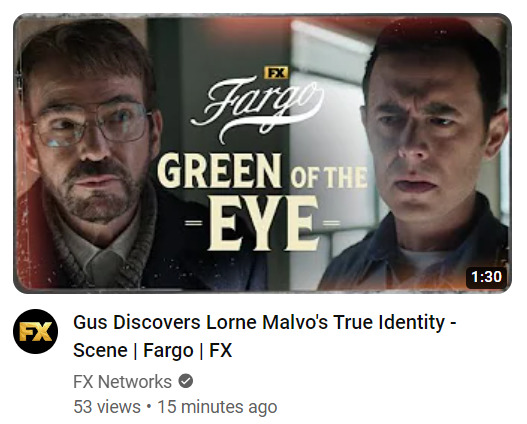
5 notes
·
View notes
Text
FARGO S4 AGE CONFUSION
hello welcome to my hell post it’s currently 2 in the morning and I have to wake up at 6 instead im doing this
So as we all know; there’s a lot of confusion about the ages of Josto Fadda and Patrick “Rabbi” Milligan. (And therefore Gaetano, since he’s Josto’s younger brother.)
So first off-
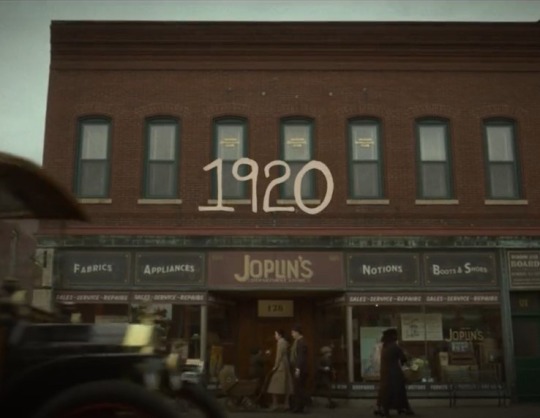
This is the year the Moskowitz’ trade Ari for Rabbi.
On the IMDB page for the episode, this is listed:

This means that Rabbi Milligan was born in 1913, or at least within the timeframe.
Next year is…

On the IMDB:

This would mean that Rabbi Milligan was born in 1916.
Next…
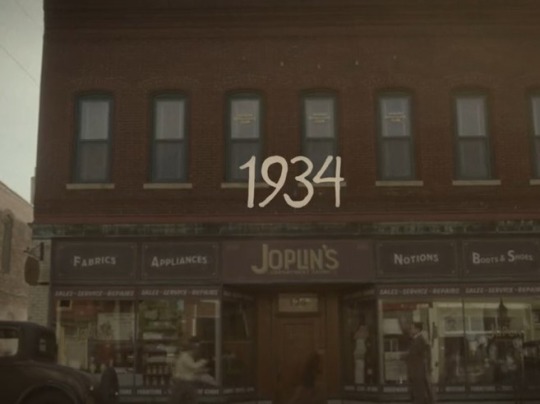
On the IMDB:

Saying 15-17 years old, it means he was born around 1917-1919.
Going through this, we’re to assume that he was born around 1913-1919, however, one can’t really assume 1915-1919, because he would have had to be 5 or younger in 1920. Based on this, he was born in either 1913-1914, making him around 36-37 years old in 1950. Nice!
As for Josto…

Josto only has one child actor, and that is…
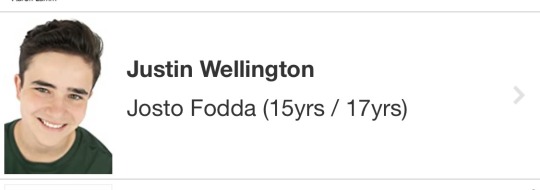
15-17 means he was born in 1915-1919. However, one thing that is overlooked? The scene where the Faddas kill the Milligans is in 1937- remember, Josto said he was with the Milligans for 3 years- if you assume that 15-17 is the age he was in 1937 (which is logical because do you really think he would be 20 in 1937?) he would be born in 1920 or 1922, making him 28-30 years old in 1950.
So about Gaetano… It’s listed throughout the show that he is Josto’s YOUNGER brother. Automatically, he is less than 28-30 years of age, though one can assume he is older than 25, making him around 25-29 years of age, or born in 1921-1925. But… He isn’t present in 1934- remember, he went back to Italy when he was 11- and there wouldn’t be a reason for him NOT to be present at the Milligan/Fadda trade-
1934-11 = 1923. Gaetano’s birthday is 1923-1925, making him 25-27.
Anyway I’m going to go update the wikia now lemme know how y’all think about this post ❤️
25 notes
·
View notes
Photo

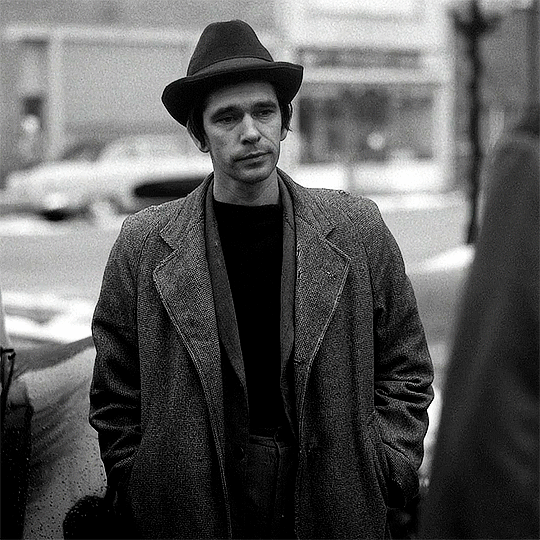
Ben Whishaw as Patrick “Rabbi” Milligan in FARGO 4.09 East/West
costumes by J.R. Hawbaker
#fargoedit#tvedit#costumeedit#fargo#fargo fx#ben whishaw#rabbi milligan#j.r. hawbaker#made by carolyn#i just LOVE this look in black and white????#also just discovered i've been misspelling ben whishaw's name for YEARS#there's TWO h's????#this is ooc i am a good speller :(
193 notes
·
View notes
Text
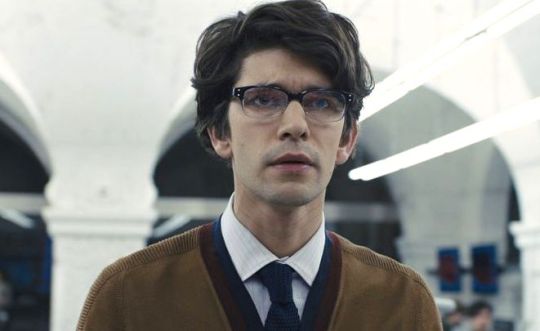
Benjamin John Whishaw (born 14 October 1980) is an English actor. After winning a British Independent Film Award for his performance in My Brother Tom (2001), he was nominated for an Olivier Award for his portrayal of the title role in a 2004 production of Hamlet. This was followed by television roles in Nathan Barley (2005), Criminal Justice (2008) and The Hour (2011–12) and film roles in Perfume: The Story of a Murderer (2006), I'm Not There (2007), Brideshead Revisited (2008), and Bright Star (2009). For Criminal Justice, Whishaw received an International Emmy Award and received his first BAFTA Award nomination.
In 2012, Whishaw played the title role in a BBC Two adaptation of Richard II, broadcast as part of The Hollow Crown series of William Shakespeare adaptations, for which he won the British Academy Television Award for Best Actor. The same year, he appeared as Q in the James Bond film Skyfall (2012), going on to reprise the role in Spectre (2015) and No Time to Die (2021). He has voiced Paddington Bear in Paddington (2014), its sequel Paddington 2 (2017) and the follow-up television series. His other film roles in the 2010s have included Cloud Atlas (2012), The Lobster (2015), Suffragette (2015), The Danish Girl (2015), and Mary Poppins Returns (2018). In 2020, he had a leading role as Patrick "Rabbi" Milligan in the fourth season of the black comedy crime drama Fargo.
Whishaw received a third BAFTA Award nomination for the leading role in London Spy (2015) and, for his portrayal of Norman Scott in the miniseries A Very English Scandal (2018), won the British Academy Television Award for Best Supporting Actor, the Golden Globe Award for Best Supporting Actor – Series, Miniseries or Television Film and the Primetime Emmy Award for Outstanding Supporting Actor in a Limited Series or Movie.
More recently he takes a starring role as a Doctor in the BBC TV
series This is Going to Hurt about a Maternity Ward in a NHS hospital...wonderful stuff, and a must see series....
4 notes
·
View notes
Text
Fargo Season 4 Finale Post-Credits Scene Explained
https://ift.tt/eA8V8J
This Fargo article contains spoilers for the season 4 finale.
Fargo season 4’s finale, “Storia Americana,” wraps up an uneven season of FX’s crime series about as effectively as one could have hoped. The hour is thematically consistent, if a little short (which may have had something to do with the final two episodes’ abbreviated COVID-19 production schedule). In true Fargo fashion, the season ends with plenty of our main characters dead. Josto Fadda (Jason Schwartzman) is killed for not properly realizing the power of his own family (and for a simple misunderstanding with killer nurse Oraetta Mayflower), while Loy Cannon (Chris Rock) is killed for underestimating the power of another family.
All in all, “Storia Americana” tells a rather complete story…or storia. But then, Fargo showrunner and this episode’s writer Noah Hawley decides to give viewers one more post-credits scene for the road. The post-credit scene in “Storia Americana” brings back a beloved actor and character from the show’s second (and best) season, and ties him into the loose Fargo continuity in a rather effective way. Here is what you need to know about the post-credit scene from this season 4 finale.
Midway through the Fargo season 4 finale credits, the black screen slowly gives way to a cracked asphalt road somewhere out in the American Midwest. Then the camera pans up to find a car driving down that lonely highway. Sitting in the backseat of that car is none other than Mike Milligan (Bokeem Woodbine). Mike was one of the central antagonists from Fargo season 2 – a charismatic and talkative enforcer sent by the Kansas City mob to deal with the Gerhardt family, Fargo’s most notable crime syndicate in the ‘70s. Driving the car is one of the two Kitchen brothers (Wayne and Gale, played by Brad and Tood Mann), who served as Mike’s bodymen.
As Mike looks out the window, a scene of Loy Cannon’s son Michael a.k.a. “Satchel” walking down the road after escaping the Faddas fades in and is displayed beside Mike’s face. The implication here is clear. As many viewers have long-suspected, Michael “Satchel” Cannon grows up to be Mike Milligan. It turns out that being traded from one crime family to another, experiencing that new family trying to murder you, only to return home to one’s birth father just in time to watch him die is a compelling formula for how to create a murderer.
Fargo, bless it, was never shy about dropping clues to Satchel’s ultimate fate. In the first minutes of season 4’s premiere, the show reveals that one of Kansas City’s earliest gangs is the Irish crime family known as “The Milligan Concern.” This set off some alarm bells for Fargo fans, who are presumably always thinking about Mike Milligan. They knew a guy named Milligan, and he came from Kansas City after all!
Of course, the Milligan Concern was not long for this world, edged out first by a Jewish gang, and then by an Italian one. The name lived on, however, in the form of Patrick “Rabbi” Milligan (Ben Wishaw). Rabbi Milligan is so-named because he was traded by his Irish family to the Moskowitz Syndicate. After a few years, Rabbi helped his old family take out his new one and the Moskowitzes were annihilated. Then, when the Fadda Family came to town, Rabbi’s father humiliated him by trading him again instead of his younger brother. Rabbi then helped the Faddas take out his own family, including him personally executing his own father.
Throughout the series Rabbi Milligan proves to be a valuable companion to Satchel Cannon, after Satchel himself is traded to the Fadda Family. If there’s anything that Rabbi knows, it’s what it feels like to be traded as part of a power-sharing agreement between two crime families. Rabbi and young Satchel a.k.a Mike Milligan grew close, and when the order came down from Josto to kill Satchel, Rabbi saved the boy’s life and the pair hit the road together. Rabbi saved Mike’s life once again, but in the process was carried off by a tornado (because Fargo). This sent Mike out on the road alone with only his motel terrier buddy Rabbit for company.
Perhaps Mike had eyes on returning to a “normal” life when he finally arrived home and reconnected with his father. But any hope of that ended with one gunshot from Zelmare Roulette (Karen Aldridge). Mike then presumably found his way into the life of crime like his father. Unlike his father, however, he was unable to establish his own crime family. As the Fargo season 4 finale makes clear, the days of boutique little crime families are coming to an end. The Italian mafia has infiltrated just about every meaningful aspect of organized crime in every major city. Any other crime syndicates will serve at the Italian mob’s pleasure. And it would seem that that’s just what Mike Milligan does.
cnx.cmd.push(function() { cnx({ playerId: "106e33c0-3911-473c-b599-b1426db57530", }).render("0270c398a82f44f49c23c16122516796"); });
The adult Mike Milligan is a highly proficient negotiator, diplomat, and killer. The Kansas City mob is happy to work with him because he gets things done…and can deftly recite Lewis Carroll’s “Jabberwocky” from memory. Earlier on in Fargo season 4, a character named Joe Bulo was introduced to Josto. Joe Bulo is actually a character in Fargo season 2 (played by Brad Garrett), and it is he who convinces the Kansas City crime family to send Mike Milligan north to shore things up with the Gerhardts. It now seems clear that Joe Bulo being introduced this season was no accident and it is he who helps transition one-time Fadda family member Mike “Satchel” Cannon deeper into the crime world. And when Mike enters into that world, he adopts the name of Rabbi Milligan, the man who saved his life over and over again.
Each season of Fargo is distinct and is intended to be appreciated on its own merits. Through four seasons now, however, the show has filled out its modest canon here and there. Season 2 previously revealed that Dodd Gerhardt’s helper Hanzee Dent (Zahn McClarnon) received plastic surgery to become Fargo mob leader Moses Tripoli. Season 3 also had some tenuous ties back to season 2, including the existence of Mr. Wrench. It’s this Mike Milligan reveal though that proves once and for all just how deep the Fargo rabbit hole can go.
The post Fargo Season 4 Finale Post-Credits Scene Explained appeared first on Den of Geek.
from Den of Geek https://ift.tt/3lkiAAF
6 notes
·
View notes
Photo
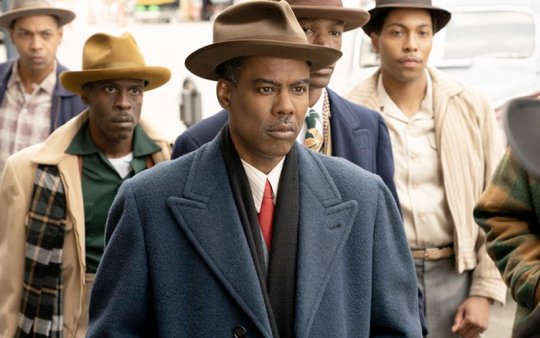
https://www.fanbolt.com/111096/fargo-season-4-review-the-results-of-racism-xenophobia/
Spoilers Below
Fargo Season Four, created by Noah Hawley, wrestles with racism, xenophobia, and the unraveling of the myth that crime families are romantic in any way. The season occurs in 1950’s Kansas City and follows two prominent crime families. We have the African American crime syndicate called Cannon Limited, led by Loy Cannon (Chris Rock), and the Sardinian Fadda Family, who’s new Don is the Italian American Josto Fadda (Jason Schwartzman). These two crime syndicates are vying for absolute power in the Kansas City underworld.
Josto Fadda and Loy Cannon dismantle the myth that these crime syndicates are all about family loyalty. Fargo shows how little these men value their families from the very beginning of the story.
In the 1920s, to stop any significant gang wars, the bosses of The Jewish Moskowtiz Syndicate and The Irish Milligan Concern traded their young sons. Gangsters from all sorts of families did the same kind of trade from the 1930s to the 1950s.
Loy’s youngest son Michael “Satchel” Cannon, is traded with Justo’s youngest brother Zero Fadda. Neither Loy nor Josto cares enough about their young immediate family members to make a deal that doesn’t put them in danger to maintain peace. Both crime organizations consider, at least once, killing one of the young boys, showing a lack of regard for innocent lives.
Finally, Ebal Violante, Consigliere to the Fadda Family, executes Josto and his lover Oraetta (a nurse whose an angel of mercy), thinking Josto had the nurse kill his father, Don Donatello Fadda. Violante also believes that Josto murdered his little brother Gaetano Fadda.
The consigliere views Josto as power-hungry. And while Josto gladly took over Don’s position after his father died, he did not order Oraetta to smother Donatello. He didn’t assassinate Gaetano, but both brothers vied for control of the “Family” for the most season. Both Josto and his little brother attempted to kill each other several times. These crime syndicates value money over their flesh and blood.
Season Four has a compelling story but is not as innovative as past seasons. Hawley spoiled audiences in Fargo Season Three with brilliant editing, sound, and cinematography. (The best example of the innovation is in episode four; Bill Bob Thornton narrated Sergei Prokofiev’s “Peter and the Wolf” while everything unravels for the brothers Emmit and Ray.) During this current season, the closest thing to innovation is the all black and white episode nine, “East/West,” where the story centers around Patrick “Rabbi” Milligan and young Satchel escaping the dangerous world of Kansas City. The only problem is that there is no reason why the episode is in black and white, so it took me out of the story. No other episodes had played with color. All of this being said, the enthralling part of Season Four is the narrative, so don’t expect the same insightful production value as previous storylines.
Racism is explored in this series through the actions of Canon Limited. Loy and his Consigliere Doctor Senator operate a Black Bank in their neighborhood partly because it helps them keep control. But there is also a need. No mainstream bank will service African American customers. Loy invents the credit card after realizing that people like to appear wealthier than they are. Credit Cards are being used by Black banks countrywide, but no White store will accept them as payment.
The two Black men pitch the credit cards concept to Mr. Winckle, Winckle Savings & Loans. They want their cards to be used in White society to earn more significant profits. Mr. Winckle refuses the idea because he doesn’t think hard-working Americans would spend money they don’t have. But race plays a part. Winckle refers to Senator and Loy as “boys” when he refuses the deal, even though both men are his age or older. The fact that White stores won’t work with the Black Bank shows how systematic racial prejudice is in the 1950s and even today. Fargo Season Four also points out that the definition of “White” has shifted throughout American history.
Xenophobia is another American problem wrestled with in Season Four. While speaking to his son Josto in their car, young boys shoot Don Fadda in the throat with BB guns. Rabbi and the other gangsters urgently pull over at the nearest private hospital. The hospital administrator Dr. Harvard refuses to save his life because they are not respectable “Americans” (code for Italians) even though most of them were born in the United States. Medical personal should care for any patient no matter their class, criminal record, or ethnicity. If Dr. Harvard had taken Don Fadda as a patient, Nurse Oraetta wouldn’t have euthanized him in the public hospital.
Italians were not considered Americans back in the 1950s. The United States rejected most foreigners or people of color, creating Italian, Jewish, Irish, and Black crime syndicates. These ethnic groups had no lucrative employment opportunities outside of the underworld. But instead of fighting the system that oppressed each of them, these “outsider” gangsters are greedy. Each marginalized group steps on the others’ neck to gain power for themselves, ignoring the immense authority that saw them all as less than “White” Americans.
Season Four is not the best part of the Fargo anthology, but it tackles topical issues and has an engaging story. Hawley subverts the gangster genre like the Coen Brothers do in their films. The casting is perfect, and everybody is on the top of their game. The gangster characters speak Italian bringing a sense of authenticity.
#fargo season 4#tv show#tv review#reviews#blogger#chris rock#jason schwartzman#josto fadda#loy cannon#kansas city#gangster#gang#crime syndicate
4 notes
·
View notes
Link
In a slightly different world, Fargo season 4 might never have happened. After the FX anthology drama ended its third season, creator Noah Hawley admitted that he didn’t have an idea for a follow-up. And, he figured, “the only reason to do another Fargo is if the creative is there.” So, if there was to be a sequel, Hawley estimated it would take three years. That was in June 2017.
Thirty-nine months later (it would have been 34 had COVID not temporarily halted production), the show has reemerged with a story whose timeliness is obvious. It marks a significant departure from the earliest seasons of Fargo, which pitted good and evil archetypes against each other in arch, violent crime capers that ultimately erred on the side of optimism. Season 3 flirted with topicality, from an opening scene that hinged on Soviet kompromat to a hauntingly inconclusive final showdown between the latest iterations of pure good—represented by Carrie Coon’s embattled police chief Gloria Burgle—and primordial evil (David Thewlis’ terrifying V.M. Varga). Five months into Donald Trump’s presidency, that ending simultaneously reflected many Americans’ fears for the future and suggested that the battle for the human soul would be an eternal one. You can imagine why Hawley might have considered it a hard act to follow.
Instead of trying to top the high-flown allegory of its predecessor, the fascinating but uneven new episodes tackle conflicts of a more earthly nature: race, structural inequality, American identity. To that end, Fargo season 4 ventures farther south and deeper into history than it has gone before, to Kansas City, Mo. in 1950. For half a century, ethnic gangs have battled over the midsize metropolis. The Irish took out the Jews. The Italians took out the Irish. Finally, just a few years after a brutal World War in which fascist Italy numbered among the United States’ enemies, the Great Migration has brought the descendants of slaves north to this Midwestern city whose complicity in American racism dates back to the Missouri Compromise.
This upstart syndicate is led by one Loy Cannon (Chris Rock in a rare dramatic role), a brilliant, self-possessed power broker who doesn’t relish violence but is determined to exact reparations from this country, on behalf of his beloved family, by any means necessary. Loy’s deputy and closest friend is a learned older man by the name of Doctor Senator (the great Glynn Turman, all quiet dignity). In an early episode, the two men walk into a bank to pitch its white owner on an idea they’ve been testing out through less-than-legal means in the Black community: credit cards. (“Every average Joe wants one thing: to seem rich,” Loy explains to the banker.) He turns them down, of course, convinced that his clientele would have no interest in purchasing things they couldn’t afford. We’re left wondering how the ensuing saga might’ve been different if Loy and Doctor Senator had been allowed to channel their considerable intelligence into a legit business.

Elizabeth Morris/FXSalvatore Esposito and Jason Schwartzman in ‘Fargo’
The Italians, meanwhile, are starting to enjoy the rewards of their newfound whiteness—a largely invisible transformation marked in The Godfather by Michael Corleone’s relationship with naive WASP Kay Adams. (In keeping with previous seasons’ allusive style, Fargo often playfully evokes Francis Ford Coppola’s trilogy.) In the wake of their capo father Donatello’s (Tommaso Ragno) death, two brothers battle for control of the Fadda clan—a crime family that has Italian-accented patriarchalism written into its very name. Crafty, spoiled, crypto-corporate Josto (Jason Schwartzman, doing a scrappier, cannier take on his Louis XVI character in Sofia Coppola’s Marie Antoinette) has long been Donatello’s right hand. But his younger brother Gaetano (Salvatore Esposito, imported from Sky Italia’s acclaimed organized-crime drama Gomorrah), a brawny brute who came up in Sardinia busting heads for Mussolini, stands between Josto and the consolidation of power.
Generations-old tradition dictates that if two syndicates are to share turf in Kansas City, their leaders must raise each other’s sons. These exchanges are supposed to be a sort of insurance policy against betrayal; never mind that they never work out as planned. So Loy very reluctantly trades his scion Satchel (Rodney Jones) for Donatello’s youngest (Jameson Braccioforte). The boy finds a protector in the Faddas’ solemn older ward, Patrick “The Rabbi” Milligan (Ben Whishaw, humane as always), who double-crossed his own Irish family in an earlier transaction.
Ethelrida Pearl Smutny (E’myri Crutchfield from History’s 2016 Roots remake) is the show’s other innocent youth, a bright and insightful Black teenager whose parents (Anji White and indie rocker Andrew Bird) own the poignantly named King of Tears funeral home. Every Fargo season needs a personification of goodness, and in this one it’s Ethelrida. Not that her virtuousness makes her life any easier. In a voiceover montage that opens the season premiere, she tells us that she learned early on that, as far as white authority figures were concerned, “the only thing worse than a disreputable Negro was an upstanding one.” Her inscrutable foil is Oraetta Mayflower (Jessie Buckley), a white nurse neighbor whose patients tend to die before they can experience too much pain. Oraetta’s quaint Minnesota accent (another Fargo staple) belies the racist views she politely but unapologetically espouses; she seems fixated on making Ethelrida her maid.
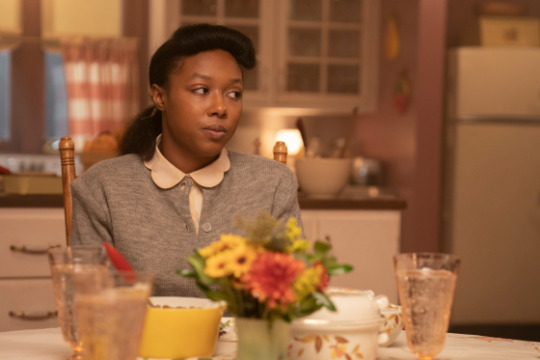
Elizabeth Morris/FXE’myri Crutchfield in ‘Fargo’
It’s fitting that Oraetta is both the most tangible link to Fargo’s home turf and the first character who ties together the mobster’s story with that of the Smutny family. As her loaded last name suggests, she seems to embody a particular form of evil that has been a constant in American life since the colonial period: white supremacy. Oraetta harms, kills and plunders with minimal consequences. No wonder she has eyes for Josto, the first Fadda who knows how to wield his white identity, building alliances with government and law enforcement that would be impossible for the Cannon syndicate. (Josto’s version of Kay Adams is the homely daughter of a politician.) “I can take all the money and pussy I want and still run for President,” he boasts at one point.
The reference to our current President’s briefly scandalous Access Hollywood tape is so flagrant as to elicit an involuntary groan. It’s lines like this that expose the limitations of Hawley’s attempt to fuse the topical and the elemental. Fargo still creates an absorbing, cinematic viewing experience, with painterly framing, pointedly deployed split-screen and arcane yet evocative needle drops. A not-at-all-gratuitous black-and-white episode could almost stand on its own as a movie. And, as in past seasons, the show gives us many remarkable performances: Rock may seem an odd pick for a gangster role, but the same shrewdness and indignation that fuel his stand-up persona also simmer beneath Loy’s measured surface. The pain Whishaw’s character carries around in his body goes far beyond what can be conveyed in dialogue. Bird broke my heart as a meek, loving dad. But in his eagerness to make a legible, potent political statement, Hawley struggles to find the right tone and keep the season’s many intersecting themes straight.
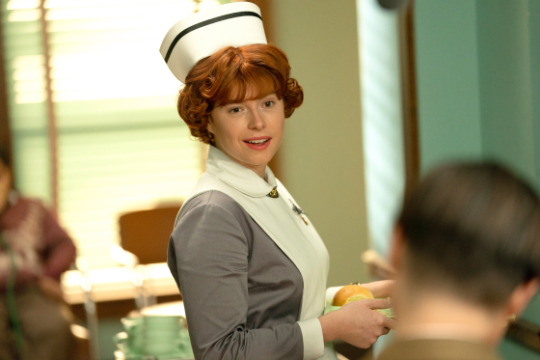
Elizabeth Morris/FXJessie Buckley in ‘Fargo’
The show is simply trying to do too much within a limited framework. Fargo wouldn’t be Fargo without some eccentric law enforcement, so an already-huge cast expands to fit a crooked local detective with OCD (Jack Huston) and Timothy Olyphant—whose roles on Deadwood and Justified made him prestige TV’s quintessential cop—as a smarmy, Mormon U.S. Mashal who snacks on carefully wrapped bundles of carrot sticks. Yet Hawley also realized that he needed to break from previous seasons that, like the Coens’ film, cast a white police officer as the avatar of goodness; hence Ethelrida, whose investigation into her city’s criminal underworld takes the form of a school assignment, and whose soul is stained by neither corruption nor white privilege. She’s a wonderful character, but her and Oraetta’s story line can feel peripheral to the gang war.
With such a crowded plot, it’s no wonder the show can’t maintain a consistent tone. Each season of Fargo creates a hermetically sealed moral universe, doling out divine and definitive justice to each character according to their position on the spectrum spanning from good to evil. In the past, its archness has served as a self-aware counterbalance to the sanctimony inherent in such a project. And there’s still plenty of irreverence in season 4, particularly when it comes to Hawley’s depiction of the Faddas, Oraetta and the other white characters. But there’s nothing funny about the oppression and discrimination that Loy, Doctor Senator and Ethelrida face. Each of their fates is shaped at least as much by a society that is hostile to people who look like them as it is by the moral choices they make as individuals. So the scripts give them the dignity they deserve at the expense of inflicting earnestness—along with frequent reminders, such as Schwartzman’s Trump line, that the story’s themes remain relevant today—on a format that isn’t built for it. Realistic characters and absurd ones awkwardly mingle.
Hawley’s attempt to correct his show’s political blind spots is laudable, and some pieces of the allegory work well; the ritual of ethnic gangs trying—and failing—to work together by raising each other’s sons makes an inspired metaphor for America’s fragile social contract. Even so, Fargo seems fundamentally ill-equipped to address systemic inequality. Though that failing may well render future seasons similarly flawed, if not impossible, in our current political climate, it doesn’t negate the pleasures or insights of what remains one of TV’s most ambitious shows. Like this nation, the new season is a beautiful and ugly, inspiring and infuriating, a tragic and sometimes darkly hilarious mess. As frustrating as it often was to watch, I couldn’t look away.
2 notes
·
View notes
Photo

Merhaba dostlar, bu seferki dizi öneri döngümüzde sizlere suç, dram, gerilim temalı Fargo-2014 yapımı diziyi öneriyorum. Yapımcılığını Noah Hawley’nin yaptığı dizi ‘’her sezon farklı hikaye’’ tarzıyla izleyenlerin fazlasıyla beğenisini kazanmış durumda. Özellikle 1. Sezon ile beni oldukça etkileyen dizi diğer sezonlarıyla da temposunu kaybetmeden başarıyla ilerlemiştir. Yaptığım araştırma sonrasında Noah Hawley 5. Sezonu da yapmak istiyor, ulaştığım bilgilere göre 2022 yılının sonları veya 2023 yılının başlarında Fargo 5. Sezonu görebiliriz, merakla bekliyoruz. Sizlere, dizinin 1. Sezon 1. Bölümünden bir repliği olduğu gibi paylaşıyorum. ‘’Çünkü bazı yollara girmemelisin. Çünkü haritalarda ‘’Burada ejderhalar var.’’ yazardı. Artık yazmıyor. Ama yazmaması, ejderha olmadığı anlamına gelmez.’’ Bu söz insanın içine öyle bir işliyor ki tüyleriniz diken diken oluyor, kendinizi daha da fazla kaptırıyorsunuz. Imdb Genel Puan: 8,9 Imdb 1. Sezon Ortalama Puan: 9,2 Imdb 2. Sezon Ortalama Puan: 9,1 Imdb 3. Sezon Ortalama Puan: 8,6 Imdb 4. Sezon Ortalama Puan: 7,6 Sezon Başına Bölüm Sayıları; 1. Sezon: 10 Bölüm 2. Sezon: 10 Bölüm 3. Sezon: 10 Bölüm 4. Sezon: 11 Bölüm Dizinin oyuncu listesini sezon sezon paylaşıyorum. 1. Sezon: Başrollerde, Billy Bob Thornton/Lorne Malvo, Allison Tolman/Molly Solverson, Colin Hanks/Gus Grimly, Martin Freeman/Lester Nygaard bulunmakta. 2. Sezon: Başrollerde, Kirsten Dunst/Peggy Blumquist, Patrick Wilson/Lou Solverson, Jesse Plemons/Ed Blumquist, Jean Smart/Floyd Gerhardt, Ted Danson/Hank Larsson bulunmakta. 3. Sezon: Başrollerde, Ewan McGregor/Emmit Stussy, Carrie Coon/Gloria Burgle, Mary Elizabeth Winstead/Nikki Swango, Goran Bogdan/Yuri Gurka, David Thewlis/V.M. Varga bulunmakta. 4. Sezon: Başrollerde, Chris Rock/Loy Cannon, Jessie Buckley/Oraetta Mayflower, Jason Schwartzman/Josto Fadda, Ben Whishaw/Rabbi Milligan, Jack Huston/Odis Weff bulunmakta. Fargo’da aradığınızdan fazlası var dostlar! Keyifli seyirler dilerim. #fargo #tvseries #dizi #dizitavsiyesi #imdb #noahhawley #fx #hulu #suçdizisi #dram #gerilim #crime #drama #thriller #keşfet #kesfet #takipet #paylaş #beğeni #yorum #etkileşim #essentials #essential #🎥 #📺 https://www.instagram.com/p/CO35OkugcVa/?igshid=84vv9lb99v13
#fargo#tvseries#dizi#dizitavsiyesi#imdb#noahhawley#fx#hulu#suçdizisi#dram#gerilim#crime#drama#thriller#keşfet#kesfet#takipet#paylaş#beğeni#yorum#etkileşim#essentials#essential#🎥#📺
1 note
·
View note
Text
Maybe this is a common experience or maybe it’s just me: do you ever make up a head canon/background for a character that is never covered in the actual canon so totally up for interpretation, but it becomes so true for you that you can’t read other people’s interpretations cuz they conflict with yours?
Back when Fargo S4 first aired I started writing some vignettes about Patrick/Rabbi Milligan and his time with the Moskowitz family, but I never finished and never posted it, so there’s no way anyone could ever know what my own ideas were. Yet when I read other fanfics that have their own version of that time, I’m like “no! I can’t accept this! *plugs ears* Lalalala can’t hear you!” The fuck is wrong with my brain?
0 notes
Text
Fargo Season 4 - Chris Rock stars with 'Q' +Trailer
New Post has been published on https://filmreviewonline.com/2020/09/25/fargo-season-4-chris-rock-stars-with-q-trailer/
Fargo Season 4 - Chris Rock stars with 'Q' +Trailer
As we have now come to expect Fargo Season 4 presents us with a new dark comedy-crime this time set in Kansas City in the 1950. Chris Rock plays the main character. He’s the head of a crime syndicate.
We are 600 miles from Fargo, North Dakota. So we are still in Fargo territory, the Midwestern United States. Among this years interesting actors you will spot Bond’s Q, aka Ben Whishaw.
Release date
Season 4 was due to be be released April 2020 but delayed due to Covid-19. In August the crew caught up with the remaining two episodes. These were completed by September 9th. So now we have the airdate on FX of this coming Sunday, September 27th, 2020. We have two episodes on the first night with the rest following weekly. In the UK, Channel 4 is again expected to screen the series but no date has yet been announced.
Here’s the trailer and lowdown of year four. Pre-release, previews are good.
Fargo Season 4 – Trailer
Fargo Season 4 – Lowdown
In 1950 Kansas City, two crime syndicates fighting for a piece of the American dream have struck an uneasy peace. Together, they control an alternate economy of exploitation, graft and drugs. Loy Cannon (Chris Rock), the head of the Black crime family, wants to cement their truce. So he trades his youngest son Satchel (Rodney Jones), to his enemy Donatello Fadda (Tommaso Ragno). Donatello is the head of the Italian mafia. In return, Donatello surrenders his youngest son Zero (Jameson Braccioforte) to Loy.
Truce Threatened
When Donatello dies in the hospital following a routine surgery, the tenuous truce is threatened. Josto Fadda (Jason Schwartzman) takes up his father’s mantle. But his efforts to stabilize the organization are undermined by his brother, Gaetano (Salvatore Esposito). He has joined the family in Kansas City after building a reputation for ruthlessness in Italy.
Fargo Season 4 – Ben Whishaw as Rabbi Milligan ©2020 FX, photo by Matthias Clamer
The other Fadda men – including Ebal Violante (Francesco Acquaroli), Constant Calamita (Gaetano Bruno) and Antoon Dumini (Sean Fortunato) – must decide where their loyalties lie. Amongst the turmoil is Patrick “Rabbi” Milligan (Ben Whishaw). A man who once betrayed his own family to serve the Italians. He watches carefully to ensure his survival.
Fargo Season 4 – Glynn Turman as Doctor Senator ©2020 FX, photo by Matthias Clamer
Sensing an opportunity, Loy tests the Faddas for weakness. He deploys his most trusted advisor, Doctor Senator (Glynn Turman). In addition he adds top lieutenants, Leon Bittle (Jeremie Harris), Omie Sparkman (Corey Hendrix) and Opal Rackley (James Vincent Meredith) to do his bidding. However, to Loy’s dismay, his oldest son Lemuel Cannon (Matthew Elam) wants no part of the family business.
Additional Characters
Intertwined with this tale of immigration, assimilation and power, are the stories of some other. One is Ethelrida Pearl Smutny (E’myri Crutchfield), the precocious 16-year-old daughter of Thurman (Andrew Bird). Another is Dibrell Smutny (Anji White), an interracial couple who own their own mortuary. We also have US Marshal Dick “Deafy” Wickware (Timothy Olyphant), a Mormon lawman; Detective Odis Weff (Jack Huston), the Kansas City cop known for his compulsive tics; and Oraetta Mayflower (Jessie Buckley), a nurse who cannot abide others’ suffering.
Fargo Season 4 – Jessie Buckley as Oraetta Mayflower ©2020 FX, photo by Matthias Clamer
Production Crew
Peabody, Golden Globe® and Emmy® Award-winning Executive Producer, Noah Hawley (creator/ writer/director), and his production company 26 Keys, leads the creative team of the latest all-new installment of the award-winning, true crime story. Warren Littlefield (The Handmaid’s Tale, The Old Man), and his production company The Littlefield Company, also serves as Executive Producer along with Joel & Ethan Coen.
Fargo is produced by MGM Television and FX Productions, with MGM Television serving as the lead studio and international distributor.
Fargo Season 4 – Season Poster ©2020 FX
#Andrew Bird#Anji White#Ben Whishaw#Chris Rock#Corey Hendrix#Ethan Coen#E’myri Crutchfield#Fargo (2014 tv)#Fargo (2014 tv) Season 4#Francesco Acquaroli#Gaetano Bruno#Glynn Turman#Jack Huston#James Vincent Meredith#Jason Schwartzman#Jeremie Harris#jessie buckley#Joel Ethan Coen#Matthew Elam#Noah Hawley#Rodney Jones#Salvatore Esposito)#Sean Fortunato#Tommaso Ragno
1 note
·
View note